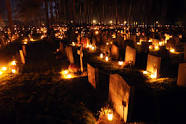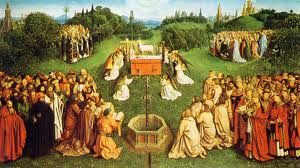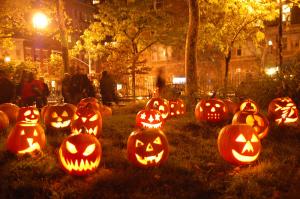Halloween or Hallowe’en (/ˌhæləˈwiːn, –oʊˈiːn, ˌhɑːl–/; a contraction of “All Hallows‘ Evening“),[6] also known as Allhalloween,[7] All Hallows’ Eve,[8] or All Saints’ Eve,[9] is a yearly celebration observed in a number of countries on 31 October, the eve of the Western Christian feast ofAll Hallows’ Day. It initiates the triduum of Allhallowtide,[10] the time in the liturgical year dedicated to remembering the dead, including saints(hallows), martyrs, and all the faithful departed believers.[11] Within Allhallowtide, the traditional focus of All Hallows’ Eve revolves around the theme of using “humor and ridicule to confront the power of death.”[12]
According to many scholars, All Hallows’ Eve is a Christianized feast initially influenced by Celtic harvest festivals,[13][14] with possible paganroots, particularly the Gaelic Samhain.[8][15][16]
- Offerings of food and drink, or portions of the crops, were left for the Aos Sí.[47][48][49][50] The souls of the dead were also said to revisit their homes.[51] Places were set at the dinner table or by the fire to welcome them.[52] The belief that the souls of the dead return home on one night or day of the year seems to have ancient origins and is found in many cultures throughout the world.[53]
- The pagan festival of the dead continued to be observed until the 6th c. when it was integrated slowly into Christian practice
- Pope Gregory the Great (540-604 AD) advised the Archbishop of Canterbury to retain the Druid sacrifices and celebrate them in honor of Christian saints
- The Holy Roman Church introduced “All Saints’ Day” on May 13, 609 AD to commemorate all those saints and martyrs who had no special day of recognition. Then in the 8th c. the day was moved from May 13th to November 1st to counteract the pagan celebrations held on that same day.
-
- “All Saints’ Day” falls on November 1st for the Roman Catholic Church and on this day “the Church honors the Angels and Saints in heaven”
-
-
- commemoration of the Saints in heaven who have not been officially canonized by the Church and who are not commemorated during the year
-
-
- Then in the 9th c. the Roman Church began holding a Eucharist of reconciliation for those dead who had not been named among the saints
- “All Souls’ Day” falls on November 2nd for the Roman Catholic Church and it is a day that “commemorates all the souls in purgatory”
-
- masses and prayers are offered that the “souls in purgatory may be released
-
- 10th c. “All Soul’s Day” was added to the Roman Catholic calendar for November 2nd (annually) for the souls still suffering in purgatory.
-
-
- Thus, all souls day was celebrated by the visiting of cemeteries and setting out “soul cakes” (currant buns), wine, tobacco and gifts for the dead became a popular practice.
- People would go from house to house begging for these soul cakes. The recipients would offer up prayers for the souls of the contributors’ dead relatives which became known as “souling”
- All Souls’ Day was not included in the church calendar during the protestant reformation (although it was restored to the calendar in 1928)
-
All Souls’ Day is a day of prayer for the dead, particularly but not exclusively one’s relatives. In Western Christianity the annual celebration is now held on 2 November and is associated with All Saints’ Day (1 November) and its vigil, Hallowe’en (31 October).[2] In the liturgical books of the western Catholic Church (the Latin Church) it is called The Commemoration of All the Faithful Departed, and is celebrated annually on 2 November, even if this date falls on a Sunday.[3] In Anglicanism it is called Commemoration of All Faithful Departed and is an optional celebration.[4] In the Eastern Orthodox Church and the associated Eastern Catholic Churches, it is celebrated several times during the year and is not associated with the month of November. Beliefs and practices associated with All Souls’ Day vary widely among Christian churches and denominations.
At the Reformation the celebration of All Souls’ Day was fused with All Saints’ Day in the Church of England, though it was renewed individually in certain churches in connection with the Catholic Revival of the 19th century. The observance was restored with the publication of the 1980 Alternative Service Book, and it features in Common Worship as a Lesser Festival called “Commemoration of the Faithful Departed (All Souls’ Day)”.
Among continental Protestants its tradition has been more tenaciously maintained. Even Luther’s influence was not sufficient to abolish its celebration in Saxony during his lifetime; and, though its ecclesiastical sanction soon lapsed even in the Lutheran Church, its memory survives strongly in popular custom. In the Methodist Church, saints refer to all Christians and therefore, on All Saint’s Day, the Church Universal, as well as the deceased members of a local congregation are honoured and remembered.
-
- October 31st is called “All Hallowed Eve” or “holy evening”
- Druids developed and held to the concept of disembodied souls that roamed the earth having not gained entrance into heaven
- Once again we see the glaring compromise of the Romish Church: the union of the Christian with the heathen festivals as the Church conquered its pagan rivals
-
- “The inflexible Protestantism of the primitive missionaries…exchanged for the supple policy, the easy tolerance, the comprehensive charity of shred ecclesiastics, who clearly perceived that if Christianity [Catholicism] was to conquer the world it could do so only by relaxing the too rigid principles of its Founder, by widening a little the narrow gate which leads to salvation” (Sir James George Frazer–“The Golden Bough”)
- Halloween or All Hallowed Even” was rejected by the English Puritans in America as a Catholic and pagan holiday. For 200-years the holiday never took hold in America; at least not until the Irish potato famine of the 1840s when 1000s of Irish immigrants migrated to America, bringing this pagan custom with them
-
- Halloween has become a night of fun and festivities, different from it being a night of fearing wandering demons in its earlier make-up
- Focus is on children
- Celebration finds its significance in modern society as:
- Wicca and Satanist High Sabbath–it is described as their holiest day of the year and in many realms a serious celebration takes place on that day/night. Halloween represents or marks the end and beginning their occult year; the beginning of death and destruction typically associated with winter; the underworld unleashes its spirits and thus they are free to roam the earth; it is a time to call upon spirits. The Wiccans and Satanists find solid links with Samhein as they believe that the “veil between the living and the dead is at its thinnest and communications with the spirit realm is much easier. Modern Wiccans have been known to assemble in circles and dance nude, calling upon spirits to visit their gathering. Satanists take it to another level. Satanists have been known to sacrifice small animals and large animals and even people in the name of Satan and all that is unholy
- Concentration on Darkness
- Focus on death
- Commercial and Festive Appeal–multi-billion dollar holiday industry
- Dabble in the Spirit Realm
- Demonic Influence
- Idolatry is Occultism
- Trick or treating is the modern equivalent of the ancient custom of people visiting their neighborhood homes on Halloween night to represent the dead in search of food. Those who give out the treat are as those in times past who attempted to appease Hecate and other nighttime demonic powers. Hecate was a goddess of the underworld
- the wearing of costumes, especially those of devils and other occult characters symbolize evil spirits seeking after mischief in the night as well as attempts at scaring away evil spirits in the night
- The creation of Jack-O-Lanterns with burning candles hearken back to a time when these objections/creations were carved and placed in front of and around homes in Gaelic territories for purposes of frightening away evil spirits
- http://christianity.about.com/od/holidaytips/i/biblehalloween.htm
- http://www.alanrudnick.org/2010/10/28/7-reasons-why-christians-should-celebrate-halloween/
- http://www.charismamag.com/life/culture/7207-why-christians-should-celebrate-halloween
What does Scripture Say Regarding Observances Such as Halloween and What His Chosen Must Do?
- Halloween is an occult holiday and in some realms even a holy day. Thus everything that is wicked, especially evil spiritual entities and concepts, are in essence objects of worship:
-
- 14 For thou shalt worship no other god: for the LORD, whose name is Jealous, is a jealous God: 15 Lest thou make a covenant with the inhabitants of the land, and they go a whoring after their gods, and do sacrifice unto their gods, and one call thee, and thou eat of his sacrifice; 16 And thou take of their daughters unto thy sons, and their daughters go a whoring after their gods, and make thy sons go a whoring after their gods.17 Thou shalt make thee no molten gods. (Exo 34:14-17; cf. 20: 3, 5)
-
- Yehovah prepares the Children of Promise for eventual conquest and habitation of the land. He warns them to become ensnared in any alliances or covenants with the peoples in these conquered lands; destroy their alters and idols; do not inquire as to their religion/gods; and do not erect any graven images of other elohims for Yehovah is a jealous God
- Yehovah demands our strict attention as He is a jealous God who will recompense judgment upon those who cheat on Him with other religions and gods (Deu. 4: 24)
- 15 Take ye therefore good heed unto yourselves; for ye saw no manner of similitude on the day that the LORD spake unto you in Horeb out of the midst of the fire: 16 Lest ye corrupt yourselves, and make you a graven image, the similitude of any figure, the likeness of male or female, 17 The likeness of any beast that is on the earth, the likeness of any winged fowl that flieth in the air, 18 The likeness of any thing that creepeth on the ground, the likeness of any fish that is in the waters beneath the earth: 19 And lest thou lift up thine eyes unto heaven, and when thou seest the sun, and the moon, and the stars, even all the host of heaven, shouldest be driven to worship them, and serve them, which the LORD thy God hath divided unto all nations under the whole heaven.1 20 But the LORD hath taken you, and brought you forth out of the iron furnace, even out of Egypt, to be unto him a people of inheritance, as ye are this day. (Deu 4:15-20 KJV)
-
- what about our personal Horebs?
- have you seen the trappings of the holiday?
- Yehovah has brought us out of Egypt (Babylon) and taken us through the crucible of life’s wilderness for one purpose and that is to be a unique peoples, wholly acceptable to Him and to be a light to the world; kings and priests; different from the rest of the world’s nations
- 19 And it shall be, if thou do at all forget the LORD thy God, and walk after other gods, and serve them, and worship them, I testify against you this day that ye shall surely perish. 20 As the nations which the LORD destroyeth before your face, so shall ye perish; because ye would not be obedient unto the voice of the LORD your God. (Deu 8:19-20 KJV)
-
- There are consequences when we dabble in such practices and traditions as Halloween
- Deu 10:20 Thou shalt fear the LORD thy God; him shalt thou serve, and to him shalt thou cleave, and swear by his name.
-
- It is therefore Yehovah and Yehovah alone we must worship
- 7 Ye hypocrites, well did Esaias prophesy of you, saying, 8 This people draweth nigh unto me with their mouth, and honoureth me with their lips; but their heart is far from me. 9 But in vain they do worship me, teaching for doctrines the commandments of men. (Mat 15:7-9 KJV)
-
- When church leaders like Alan Ruydnick and Mary Fairchild teach that Halloween must be incorporated into a Believer’s life and evangelistic outreach efforts, they are making themselves the very focus of Yeshua’s discussion here
-
- 23 But the hour cometh, and now is, when the true worshippers shall worship the Father in spirit and in truth: for the Father seeketh such to worship him. 24 God is a Spirit: and they that worship him must worship him in spirit and in truth. (Joh 4:23-24 KJV)
- A central theme of Halloween is death and Yehovah strictly forbid us to not place any concentrated focus or give credence to the dead:
-
- I haven’t eaten any of this food when mourning, I haven’t put any of it aside when unclean, nor have I given any of it for the dead. I have listened to what ADONAI my God has said, and I have done everything you ordered me to do. (Deu 26:14 CJB)
-
- Our Father is only interested in life and the propagation and salvation of life whenever possible
- 5 For in death there is no remembrance of thee: in the grave who shall give thee thanks? (Psa 6:5 KJV)
- 10 Whatsoever thy hand findeth to do, do it with thy might; for there is no work, nor device, nor knowledge, nor wisdom, in the grave, whither thou goest. (Ecc 9:10 KJV)
- Another central theme of Halloween is witches and again, Yehovah has condemn witches to die–case closed
-
- Thou shalt not suffer a witch to live. (Exo 22:18 KJV)
- Deu 18:10 There shall not be found among you any one that maketh his son or his daughter to pass through the fire, or that useth divination, or an observer of times, or an enchanter, or a witch,
- Yehovah was clear that we are not to adopt any pagan practices
-
- 9 When thou art come into the land which the LORD thy God giveth thee, thou shalt not learn to do after the abominations of those nations. (Deu 18:9 KJV)
-
- Some traditions and practices seem harmless and in many cases fun (Halloween), beautiful (Christmas) and majestic (Easter). Yet these all have pagan origin and regardless how innocent and how much the Church has over the years attempted to cover up the truth behind these holidays and traditions and paint over top of them a portrait of Christianity, those of us who know better but choose to participate are playing a fool’s game.
- Halloween has been called a good, clean, wholesome, family centered holiday. Millions of Churches participate or give credence to the day, encouraging their members to celebrate this evil night. But Yehovah has warned us:
-
- 20 Woe unto them that call evil good, and good evil; that put darkness for light, and light for darkness; that put bitter for sweet, and sweet for bitter!1 (Isa 5:20 KJV)
- Halloween is a time of darkness and fear. However, we serve a God of light
-
-
5 This then is the message which we have heard of him, and declare unto you, that God is light, and in him is no darkness at all. 6 If we say that we have fellowship with him, and walk in darkness, we lie, and do not the truth: 7 But if we walk in the light, as he is in the light, we have fellowship one with another, and the blood of Jesus Christ his Son cleanseth us from all sin. (1Jo 1:5-7 KJV)
-



